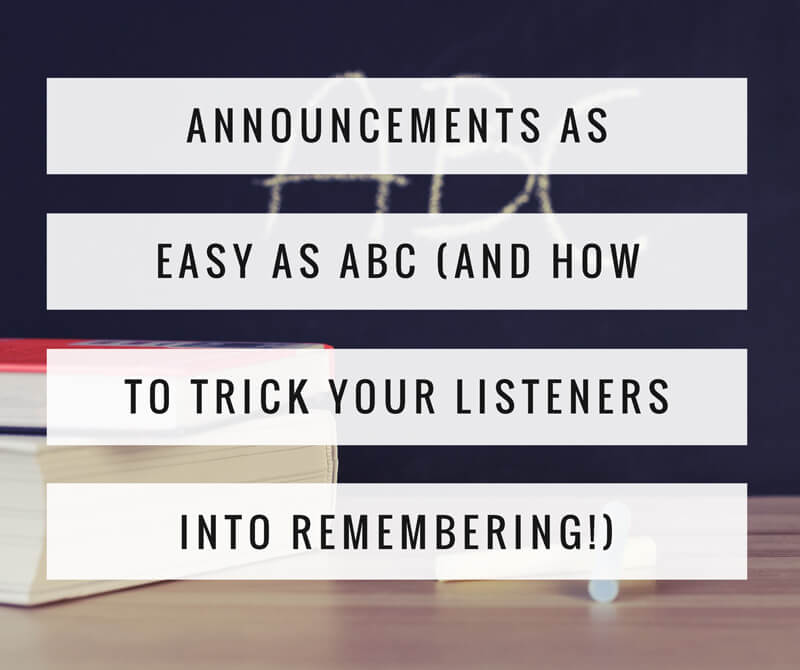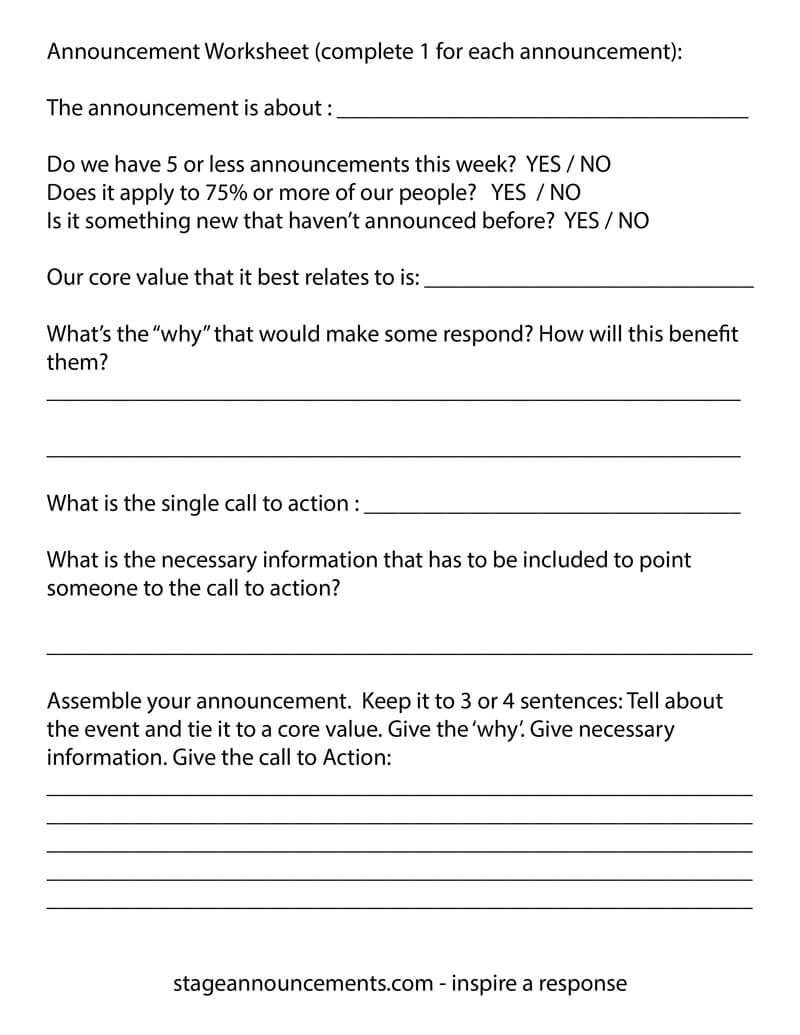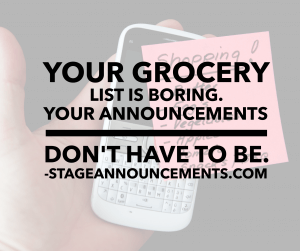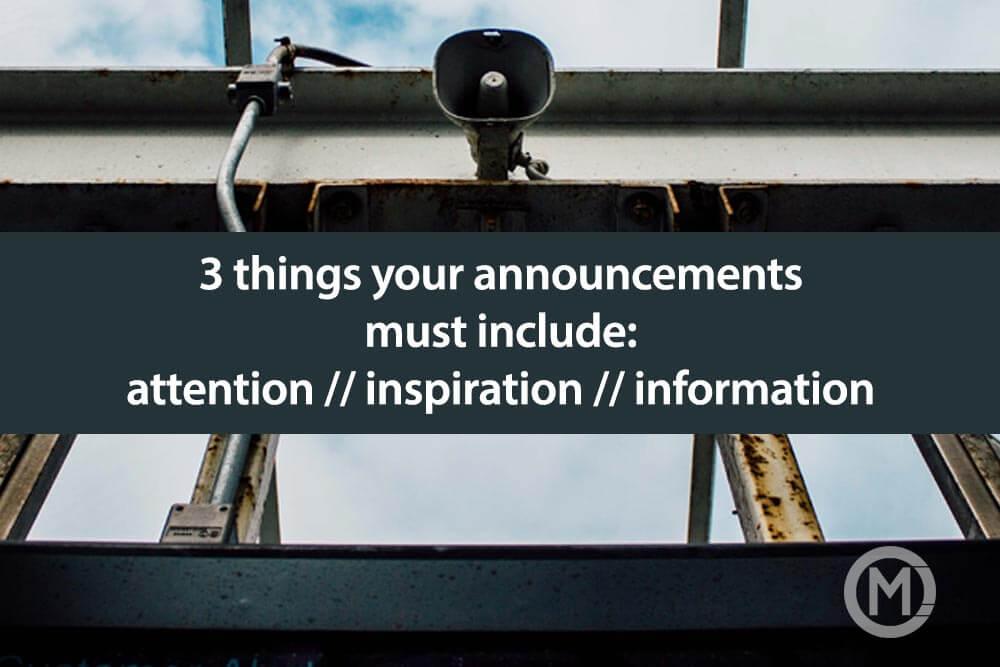There are 4 words that I try and stay away from when it comes to how we announce events and groups. The 4 words are ‘Always’, ‘Never’, ‘Everybody’ and ‘Nobody’. It’s not to say that they don’t ever appear, but when we choose these words, they are used strategically. (I’ll tell you when we DO use them at the end). We talk about strategically use these words with our team. Even as I typed them, I’m thinking about conversations we’ve had. It’s helpful to know that muscle memory dictates I consider how and when I use them.
We stay away from these words because they create a sense of black and white, inclusion and exclusion, either / or and the reality is, situations and people don’t often fall perfectly into one of two categories.
Everybody & Nobody
If we say:
“Everybody will love morning prayer at 7am on Tuesday.”
you may have someone instantly thinking to themselves “well, not me…” Is it possible they prefer to pray in the evening, or they prefer to pray alone, or they prefer to pray at 5am because they work at 7? What if you’re inviting them and saying “This is what everybody here is doing,” and that person could be thinking “They must not be including me, so I must not be in line with everybody here”
And what if the next announcement IS practical and applicable to that person, but they’re still having an internal conversation about not being included with everybody here.
This one is a personal pet peeve when whoever is speaking says:
“Everyone knows what happened to ________.”
(Jonah, Moses, David, Peter, Saul… you fill in the blank). If someone doesn’t know the story of Jonah for instance, that person is instantly not in the “everyone” category… and if the person speaking believes that everyone already knows the story of Jonah, then that person likely won’t take the chance to review.
A better way to frame that reference would be:
“In Sunday school, I was taught about Jonah and the whale. You may have seen the VeggieTales movie, or read about it in the book of Jonah. He disobeyed God and went the opposite direction of the city where God sent him, got caught in a storm on a boat and was thrown overboard. When tossed overboard, he then got swallowed by a whale and negotiated with God to save him. When God made the whale spit him out, Jonah made sure he finished God’s instructions… Here’s the point of the story… “
It takes less than 30 seconds to summarize the story, so you’re not boring people who already know, it’s a rem diner for people who are a little fuzzy, plus for a new believer who isn’t familiar with that story, you gave them 3 places to go to find out: Sunday school (a great place for new believers to start serving and learn Bible basics by the way…), VeggieTales’ Jonah and the book of Jonah.
In reverse:
“I know nobody here will miss prayer this Tuesday morning at 7am.”
It has a different sort of connotation. This could really hurt the trust that’s been built with your church. “If I don’t come to prayer, then they’re saying I’ll be the only one.” Maybe that person’s internal conversation becomes “Well, they don’t know how busy I am.” or “I guess this church is only for management class and above who get to work a 9-5, but I’m on rotating shift work.”
To get around the option of using Everybody or Nobody, I like to frame conversations with an ‘If’. If you’re a morning person and would like to pray together, we have prayer on Tuesday morning at 7am. If you’re an evening person, or your schedule is changing, you can download our prayer podcast and listen on your schedule.
Always & Never
“We always like to take a chance to….” is usually followed by “…except when…”
What if you didn’t last week, or you didn’t last month, or you missed a day once. Is it really Always? Remember 99% of the time isn’t always. You may be thinking that most of the time is a lot like always, and only really picky people are going to try and distinguish between them… so then what does it mean to a new believer if you tell them God is ALWAYS listening, or God ALWAYS has the best in mind for them? Can you then justify that sometimes you use always to mean most of the time, and sometimes you use always to mean always?
Since we have the choice of every word we use, why not use the word that actually says what we mean? What about Often, usually, most of the time, or consistently, rarely, few and far between, have or haven’t.
Instead of:
“We always have new guests who join us and we want you to fill out a connection card. Our Pastor always follows up during the week. If you’ve never learned the basics of the Bible, join us Wednesday for our new believers class at 7pm.”
You could try:
“We often have first time guests here with us and we’d like to honor you. Please fill out a connection card so we can connect with you this week and answer any questions you have about Life Church. If you’d like to learn more about the Bible, you’re invited this week to our Bible Basics class. We hold them almost every Wednesday, and the schedule is available on your bulletin today.”
I gave it away in the always and never example, but we sometimes do use these words in a black and white context in relations to what God has spoken to us in the Bible:
God is always good. Sin is never the right choice. Everybody has sinned and fallen short of the glory of God. Because we use these words so rarely, they are naturally emphasized for full impact when we choose to use them.
.. but we rarely use these in context of our advertising.
Would love to hear your thoughts. Is this new information for you, or have you implemented a similar strategy, and how is it working at your church?


 Someone asked me if I noticed my Pastor’s reaction to a particular joke last time I did announcements. Even though he sits in the middle of the front row, I hadn’t noticed.
Someone asked me if I noticed my Pastor’s reaction to a particular joke last time I did announcements. Even though he sits in the middle of the front row, I hadn’t noticed.

 We have a rule at our house. if I’m picking up more than 3 things at the store, I need a written list. My wife knows not to trust my memory, but there is a trick that I’ve found that helps me remember more than 3 things without a list, and that’s to make those things connected somehow – make up a song that includes 5 or 6 items, or create a quick story that ties those ideas together.
We have a rule at our house. if I’m picking up more than 3 things at the store, I need a written list. My wife knows not to trust my memory, but there is a trick that I’ve found that helps me remember more than 3 things without a list, and that’s to make those things connected somehow – make up a song that includes 5 or 6 items, or create a quick story that ties those ideas together.
